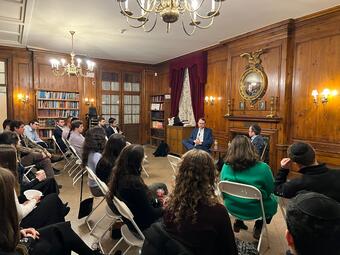On February 4th, 2024, the Zahava and Moshael Straus Center for Torah and Western Thought hosted Ari Schulman, editor of The New Atlantis, at Congregation Shearith Israel, the Spanish and Portuguese Synagogue. He joined Straus Deputy Director Rabbi Dr. Stu Halpern for a wide-ranging conversation about his experiences in STEM-related academia, his career in journalism, and his philosophical perspectives on artificial intelligence technology.
Schulman was raised in Houston, Texas with a love of science and technology, and he was fascinated by outer space. He began an undergraduate degree in physics at the University of Texas at Austin, but found himself disillusioned with his peers' apparent disinterest in the profound moral, religious, and philosophical questions underlying their scientific work. A friend recommended he read Alasdair MacIntyre’s After Virtue, and the book inspired him to pursue alternative avenues of intellectual discovery. He eventually graduated with a degree in computer science and English, motivated to engage with the philosophical foundations of the scientific world.
In 2008, shortly after graduation, Schulman interned at The New Atlantis, a magazine that covers the social, ethical, political, and policy dimensions of modern science and technology. He described The New Atlantis as embodying “exactly the kind of moral grounding in tradition and humanistic inquiry that I was looking for.” The magazine emerged from the conversations of a reading group that had been founded by Eric Cohen, Yuval Levin, and others, formerly under the auspices of the Ethics and Public Policy Center (EPPC).
Schulman reflected on his career at The New Atlantis, where he’s been working since that 2008 internship, and the impact of its writings on public policy. “We put a lot of work into crafting the articles so they are accessible to normal, everyday people,” he explained. Citing bioethicist and biblical scholar Dr. Leon Kass, Schulman explained that The New Atlantis is concerned with “human issues,” and by exploring how norms are continually challenged by new technology, the journal can reach ordinary people where they are.
The conversation also covered questions relating to artificial intelligence and the rise of large language models like ChatGPT. Dr. Halpern asked Schulman how The New Atlantis understood the rise of impact of this technology on college students today. “My gut tells me we’re facing something like an alien visitation or disruption. I hope I’m wrong about that, but [ChatGPT] makes knowing which questions to ask very difficult,” Schulman responded. “ChatGPT allows us to outsource what we most profoundly value about ourselves - reason and creativity - to machines.”
At the conclusion of the discussion, Schulman reflected on the importance of religious traditions as modern societies continue to confront artificial intelligence. “Faith communities will play an ever larger role as we go down this path,” he explained. “All the smartest founders of American projects and modern liberalism understood that liberalism couldn’t support itself on its own and had to draw on outside resources - faith and family.”
This event was hosted in coordination with the YU Straus Center Alumni Advisory Committee, chaired by YC alum Eli Diamond. The committee aims to further the impact of Straus alumni, current Straus Scholars, and other students involved in politics, policy, and journalism on both of Yeshiva University’s undergraduate campuses. Event attendees included Straus alumni, personnel from the Paul E. Singer Foundation, and professionals from the Tikvah Fund and Tablet Magazine.


